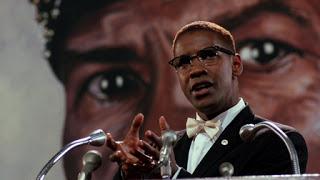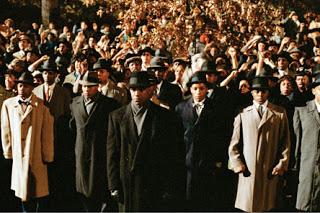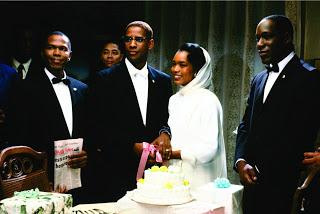 At the height of his notoriety, Spike Lee directed Malcolm X (1992). Producer Marvin Worth had been trying to make it ;for 25 years; the project passed through several directors, scripts and controversy before landing Lee. It's incredible that Malcolm X received a large-scale Hollywood biopic; more incredible that it's so good.
At the height of his notoriety, Spike Lee directed Malcolm X (1992). Producer Marvin Worth had been trying to make it ;for 25 years; the project passed through several directors, scripts and controversy before landing Lee. It's incredible that Malcolm X received a large-scale Hollywood biopic; more incredible that it's so good.Malcolm Little (Denzel Washington) loses his father to the Ku Klux Klan while his mother is institutionalized. He works as a Pullman porter before drifting into crime, becoming West Indian Archie's (Delory Lindo) right-hand man. Arrested, Malcolm converts to Islam in prison and emerges a firebrand, preaching black nationalism, denouncing white racism and moderate blacks alike. Malcolm falls out with the Nation of Islam's leader, Elijah Muhammad (Al Freeman Jr.), while a trip to Mecca softens his racial views. His newfound tolerance further enrages his rivals, leading to his assassination.
Malcolm X adapts Malcolm's autobiography for a cradle-to-grave epic. Lee incorporates homages to classic biopics: the opening invoking Patton, a Spartacus-tinged finale, Citizen Kane-style montages of Malcolm's speeches. Yet in tackling this controversial figure there's always an edge to Lee's presentation. He stages a Klan raid with spooky beauty, prison sequences with shafts of light penetrating Malcolm's cell. Less effective moments have Malcolm drifting along the sidewalk and Elijah Muhammad materializing in holograph form.
 Lee isn't as in-your-face frenetic as Do the Right Thing, but stages original set pieces. One scene shows Malcolm speaking on a street corner, Ernest Dickerson's camera seeking out other orators - Al Sharpton and Bobby Seale, playing themselves, extending Malcolm's legacy to the present. The central set piece has Malcolm's followers initiating a demonstration, marching to a hospital where a wounded colleague's being held. Lee's staging is impressively intense, so violent in build-up that the anticlimax is a relief.
Lee isn't as in-your-face frenetic as Do the Right Thing, but stages original set pieces. One scene shows Malcolm speaking on a street corner, Ernest Dickerson's camera seeking out other orators - Al Sharpton and Bobby Seale, playing themselves, extending Malcolm's legacy to the present. The central set piece has Malcolm's followers initiating a demonstration, marching to a hospital where a wounded colleague's being held. Lee's staging is impressively intense, so violent in build-up that the anticlimax is a relief.Lee and cowriter Arnold Perl painstakingly demonstrate the society which inspired Malcolm's actions. Malcolm's introduced having his hair straightened, wearing outrageous suits and dating a white woman (Kate Vernon) to show status. He's urged to abandon a law career for a carpenter's job, while being lectured about hard work breeding success. Malcolm X shows racism more pernicious than stereotyped rednecks beating blacks; instead, it's a system encouraging failure and second-class status.
Many accuse Lee of soft-pedaling Malcolm but his inflammatory rhetoric's intact. He calls Martin Luther King an Uncle Tom, insults a well-meaning white girl and calls John F. Kennedy's murder "chickens coming home to roost." By contrasting these speeches with stock footage of police violence though, we're given a context for his extremism. Lee makes Malcolm's conversion to tolerance a centerpiece; seeing people of all color visiting Mecca, he renounces separatism - alienating his former allies.
Why Malcolm X rather than a safe Civil Rights leader? Martin Luther King's family viciously safeguards his legacy; even Selma didn't earn their approval. Malcolm is fairer game for a warts-and-all biopic. In any case, touching this subject at all infuriates some viewers: conservatives like Jesse Helms labeled King a communist into the '80s. Malcolm and King advocated different responses yet both fell to assassins; they're equally valid representatives of the Civil Rights struggle.
 Denzel Washington does the material justice. Washington dials down his natural likeability, emphasizing Malcolm's intensity and anger. He affects an aw-shucks demeanor to appease whites, is flamboyantly violent as a mob enforcer, then intense, thoughtful and reasoned. Washington navigates this character arc with commendable skill, simply refocusing Malcolm's societal anger into reverse racism, then passion for change. Denzel's never been better, making Malcolm a frustrating but sympathetic protagonist.
Denzel Washington does the material justice. Washington dials down his natural likeability, emphasizing Malcolm's intensity and anger. He affects an aw-shucks demeanor to appease whites, is flamboyantly violent as a mob enforcer, then intense, thoughtful and reasoned. Washington navigates this character arc with commendable skill, simply refocusing Malcolm's societal anger into reverse racism, then passion for change. Denzel's never been better, making Malcolm a frustrating but sympathetic protagonist.Lee restricts his impressive supporting cast to walk-ons. Albert Hall (Apocalypse Now) fares best as the prison agitator who converts Malcolm, while Delroy Lindo scores an effective cameo. Angela Bassett is reduced to fretting about Malcolm's safety. Christopher Plummer is a prison chaplain, Peter Boyle a racist cop; Lee himself plays Malcolm's partner in crime and Giancarlo Esposito briefly appears.
Only in its final reels does Malcolm X become hagiography, with Ossie Davis's portentous eulogy, children declaring solidarity with Malcolm, and a Nelson Mandela cameo. Until then it's a layered portrait, sympathetic but not uncritical, of a still-controversial figure.

